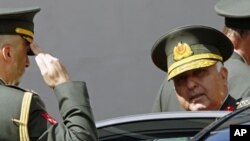Turkish President Abdullah Gul has appointed four new military commanders to replace their predecessors, who resigned last week to protest the arrests of fellow officers accused of plotting coups.
The appointments of new military commanders by Turkey’s civilian government Thursday were designed to give the country’s political leadership the edge in a longstanding power struggle with the once-dominant armed forces.
President Abdullah Gul’s spokesman, Ahmet Sever, announced the appointments of a new chief of staff and new commanders to head the army, navy and air force.
He says the president approved the nominations made by Turkey's Supreme Military Council at the end of a four-day meeting. General Necdet Ozel, who previously headed the paramilitary police (gendarmerie), was named the new armed forces chief of staff. General Hayri Kivrikoglu will head the ground forces, General Emin Bilgel becomes head of the navy and General Mehmet Erten was promoted to head of the air force. General Bekir Kalyoncu replaced Ozel as head of the paramilitary police.
The abrupt resignation by Ozel’s predecessor, General Isik Kosaner, along with the commanders of the army, navy and air force, followed years of tension between the secularist military and the Islamic-rooted government of Prime Minister Recep Tayyip Erdogan.
The former military leaders resigned in frustration over the arrests and trials of hundreds of officers accused of trying to overthrow Erdogan’s ruling AK party.
Erdogan’s government refused to give the traditional rubber-stamp to promotions by the Supreme Military Council, prompting last week’s resignations. Fourteen generals and admirals were denied promotions for suspicion of involvement in an alleged coup attempt.
Ilnur Chevik, an analyst for Turkey’s Bugan TV, argues that the Turkish government has finally imposed control over the military, paving the way for what he sees as a more Western-style democracy.
“The civilian government is prevailing. They wanted this result and they got it. So, Turkey is transforming from a military democracy to a full civilian democracy. It’s a very positive step. It’s improving the quality of Turkey’s democracy and it is putting it in par with Western democracies,” said Chevik.
Chevik doubts that the new-found supremacy of Turkey’s civilian leadership will endanger the country’s secular institutions.
“The Islamic government,” he insists, “has done nothing against secularism in the past eight or nine years, and they have lived up to secularist ideals as much as the Turkish military.”
Turkey’s military has played a predominant role in governing the country since military commander Mustapha Kemal Ataturk founded the Turkish Republic in 1923, becoming its first president. Ataturk used the military to secularize the remnants of the former Ottoman Empire.
In the years since Ataturk died in 1938, the Turkish military has played a dominant role, overthrowing four elected civilian governments since 1960.




